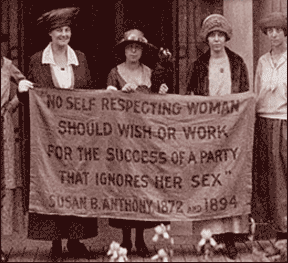I went with a good friend to see the film Suffragette. I think that every student should watch this film in school to see the dedication and sacrifices that so many women made in order to be considered equal, or even as humans. Between 1916-1921, women in Canada gathered to protest and give voice to their cause. Today I am so grateful for their courage and determination. Yet I am reminded that not all women had the right to vote in this country until 1960. That was only 55 years ago!!

Source: https://www.youtube.com/watch?v=MONqsKlGgLk
The film Suffragette provided several view points on how the movement in the UK did so much damage to so many people. Families torn apart because their mothers were in prison. Men made to feel like an outcast if they didn’t punish their suffragette wives. Men of power who felt powerless to side with the women. And finally those women who fought to the bitter end, just so that they could provide a better future for their daughters, sisters, and friends. These brave women knew that their peaceful protests were getting them nowhere, so they began acts of civil disobedience and destruction.

Source: http://www.saugeentimes.com/15%20y/Walker%20House%20heritage%20dinner%20march%203,%202013/Template.htm
Some of the film was extremely difficult to watch: Seeing innocent women beaten to the ground at peaceful protests, seeing women force-fed milk through tubes up their noses while in jail, seeing the isolation and punishment they received from family and society. Yet they persevered and continued with their cause, even to death for some. The film reenacts Emily Davison’s tragic death at the 1913 Derby when she ran in front of the King’s horse on the track. Her actions brought international attention to the movement.
Here in Canada we also have several women to thank for their bravery and their commitment to making Canada a better place. Of course all Canadians know about the Famous Five. I know I am grateful for the sacrifices all of those women made so that I can be a woman in Canada and have an education, a profession, and the ability to live on my own.

Source: http://www.wikitree.com/wiki/Space:Canadian_Suffragettes
Currently I am in the middle of reading a collection of short stories written by Lucy Maud Montgomery: The Doctor’s Sweetheart and Other Stories. I think that L.M. Montgomery is one of the champions of Canadian women. She writes about women forced into marriage at a young age. She writes about the social ostracism women faced as ‘old maids’ of 27. She writes about unhappy marriages that were doomed from the beginning. Montgomery saw that the way society treated its women was wrong and I think she sought to make some noise through her writing. I am so grateful that I live in a different time and that I am not controlled by family; instead, I am supported and encouraged in my independence.

Source: http://www.goodreads.com/book/show/853995.The_Doctor_s_Sweetheart
The women in our recent history were fighting a different kind of war: societal norms. They were fighting an enemy that couldn’t be seen. Yet they never gave up and they demonstrated that women are people and a valuable part of society. As said in the film, “I would rather be a rebel than a slave.”

Source: http://thefashionarchives.org/?people_and_places=dale-spender
“We are here, not because we are law-breakers; we are here in our efforts to become law-makers.” (Emmeline Pankhurst)
“Women who set a low value on themselves make life hard for all women.” (Nellie McClung)
“People laugh at me because I use big words. But if you have big ideas you have to use big words to express them, haven’t you?” (L.M. Montgomery)
“He upholds the cause of the oppressed
and gives food to the hungry.
The Lord sets prisoners free,
the Lord gives sight to the blind,
the Lord lifts up those who are bowed down,
the Lord loves the righteous.” (Psalm 146: 7-8)

Source: http://powellriverdailynews.com/2015/08/09/canadian-women-voting-since-1960/










































